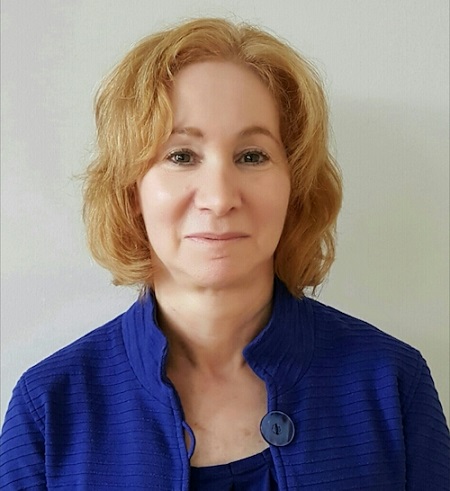One only needs to look around at virtually any CS/tech conference to realize that women are underrepresented, and that holds true of HPC. SC hosts over 13,000 HPC professionals every year, but in 2016 and 2017 only 13 percent of attendees were women. The conference aims to increase female attendance to 20 percent by 2020. Similarly, ISC reports that 10-15 percent of attendees are women, and organizers are actively working to improve gender diversity at the conference. The work of organizations like Women in HPC and efforts like XSEDE’s Broadening Participation program goes a long way to supporting women and diverse individuals in the field. Also important is visible representation of diversity in leadership positions in computer science fields because it allows underrepresented people to “see themselves” in the field (NCWIT, 2015).
To that end, in this article we present four women leaders who work in education and research fields in high-performance computing. They share how they got into HPC, plans for future contributions, and their advice for aspiring women leaders and the people who support them. HPCwire recognizes and promotes the importance of diversity to the HPC and supercomputing community and this article is the first in a series highlighting diversity within the supercomputing community.
Linda Akli – Assistant Director of Training, Education, & Outreach, Southeastern Universities Research Association & Manager, XSEDE Broadening Participation Program
Despite some challenges with my K-12 preparation coming from an under-resourced inner city school system, I obtained a degree in Computer Science from Rensselaer Polytechnic Institute and began my career in industry working on network and communication systems. Overtime, I transitioned to project management and strategic planning for a variety of technologies. While in industry, I felt isolated being the only African American female in most meetings, conferences, and at my workplace. That sparked my interest in doing outreach and exposing students to role models who look like them.
Though diversity is critical to innovation and a strong national economy, our field has significant challenges in recruiting and maintaining a diverse workforce. My participation on XSEDE has enabled me to develop innovative workforce development programs that expand the participation of underrepresented minorities, women, and researchers at under-resourced institutions in advanced computing. Being part of the process that improves the health of the field and helps someone make breakthrough discoveries or encourages a student to join the field is extremely exciting. Long-term I look forward to seeing the expanded infusion of computational and data science into curriculum and increased usage of national HPC resources by researchers at Minority Serving Institutions, especially Historically Black Colleges and Universities.
My advice to anyone entering the field, is be yourself. If you don’t fit in an environment, move on because the right one is probably around the corner. Second, find the area within HPC that supports your passion. You will do your best work if it is your passion. Third, be open minded about who might be your mentors. My mentors have been male and female but not one has been of color due to the small number that work in advanced computing. Last, develop a strong network. Your network will get you through the tough days and help you maintain perspective. My advice for supervisors and mentors is that anyone who crosses your path is worth helping along the way regardless of where they come from or what they look like. We have too many open jobs not to recognize that investing in people is how the industry will continue to thrive.
 Angie Asmus – IT Security Analyst, Colorado State University & Co-chair, Edge/Commodity Team, SCINET 2019
Angie Asmus – IT Security Analyst, Colorado State University & Co-chair, Edge/Commodity Team, SCINET 2019
I have been working in IT for almost 20 years right out of college, mostly as a sysadmin on various platforms. It has been through these opportunities that I gained valuable experience in IT security and compliance. When the opportunity presented itself to move into a security role and learn networking at Colorado State University , I eagerly accepted it.
I was awarded the opportunity to work on SCinet at SC16 through the Women In IT Networking at SC (WINS) program. At SC19 I am taking a leadership position through SciNet, as the co-chair for the team that provides wired edge connections for the conference. This includes connectivity for wireless access points, meeting rooms, committee offices, and the NOC work area. I hope to encourage and mentor other women in their careers as some important women have done for me.
My advice for aspiring women leaders is to keep working hard and learning as much as you can. It is important you are noticed for your abilities but definitely don’t be afraid to ask questions. What has helped me through my career was to find someone who was willing to mentor me. It is also important to attend or get involved with industry events and network with people as much as you can. You never know when those relationships will be helpful.
For supervisors and mentors, be willing to share information and encourage these women in their journey.
 Sharon Broude Geva, Director of Advanced Research Computing, University of Michigan, Chair of the Coalition for Academic Scientific Computation (CASC), Director of Chapters, Women in HPC
Sharon Broude Geva, Director of Advanced Research Computing, University of Michigan, Chair of the Coalition for Academic Scientific Computation (CASC), Director of Chapters, Women in HPC
I started out as what was then called a “real-time systems developer”, working on systems to acquire and analyze large amounts of streaming data. I then worked on digital signal-processing projects for sonar and radar, writing pipelined microcode and integrating software and hardware for DSPs. With Computer Science and Chemistry undergraduate degrees and a background in programming and hardware, a PhD in Computational Chemistry using supercomputers for simulating quantum mechanical effects in molecular systems perfectly tied together many of the things I was interested in. At the time, academic research groups tended to build and manage their own clusters, so the hands-on administration and learning aspects were pretty intense. However, it allowed students to gain insight into the nuts and bolts of building systems and the opportunities and limitations of architecture choices.
At this point in my career, I see my contributions as being more focused on workforce development, advanced research computing ecosystem development, and facilitation of broad and diverse solutions to catalyze and support computational- and data-enabled research. Much of this involves working with the “people aspects” of HPC and research.
It is important for supervisors and mentors to understand that meeting the goal of having a diverse workforce doesn’t end with hiring or with creating a diverse workforce pipeline. Retention must be a key concern, especially when the goal is to retain people who are members of underrepresented groups. Leaders, mentors, and supervisors need to ask themselves every day whether they are allowing biases to impact their interactions and actions. This includes their view of what people they manage or mentor want or can do, what their skills are or career progression should be, how they are being encouraged to participate and provide input, and how performance is being evaluated. We all have unconscious biases, so this also applies to supervisors, leaders, and mentors who are themselves members of underrepresented groups.
For aspiring women leaders in HPC: go for it! Research shows again and again that women are prone to think they need to meet every qualification listed (or perceived) in a job description. After decades of hiring for a wide array of positions, I can say I still haven’t met a candidate that meets all the qualifications listed. And yet, I’ve found fabulous people to hire, and we have always adjusted the position to benefit from the qualifications they do have.
 Misbah Mubarak – Assistant Computer Scientist, Argonne National Laboratory, Workshop Chair, Women in HPC @ SC19
Misbah Mubarak – Assistant Computer Scientist, Argonne National Laboratory, Workshop Chair, Women in HPC @ SC19
I grew up in Pakistan, where being a medical doctor or teacher are the typical career options for girls. However I was passionate about technology so I took a computer science course in high school, which was being offered for the first time. That is where I learned about supercomputers and asked myself, “How and when can I get a chance to work with a supercomputer?” It turned out that to specialize in HPC, I had to develop expertise in computer science first and there were only two colleges in my hometown offering an undergraduate degree in computer science. I got a scholarship for one of them but the college was a long way from my home and there wasn’t any good lodging available for girls. I ended up commuting by bus for four hours every day for the four years of my computer science college degree. That experience made me a stronger person. After college I was fortunate to earn a graduate school scholarship at Rensselaer Polytechnic Institute in the U.S., which has its own supercomputer. RPI is where I started working on HPC in collaboration with DoE national laboratories and there was no looking back from there.
I am excited to contribute towards the hardware/software co-design of supercomputers, which is important in making exascale computing possible. With future HPC architectures being increasingly heterogeneous, I am interested in exploring how these systems will evolve to support HPC, AI and big data applications.
My advice for aspiring women leaders: have faith in your abilities and learn to enjoy the process of overcoming obstacles in your career. You can achieve whatever you set your mind on, no matter how unrealistic it sounds at first.
As the lead for the Outreach, Diversity, and Education team in the Computational & Information Systems Lab at the National Center for Atmospheric Research, AJ Lauer (Twitter, LinkedIn) directs the Summer Internships in Parallel Computational Sciences (SIParCS) program and works with her team and labmates to create outreach efforts that inspire future generations of HPC users. She is a doctoral candidate in the Interdisciplinary Leadership EdD program at Creighton University where her dissertation work will focus on women leaders in HPC.






























































